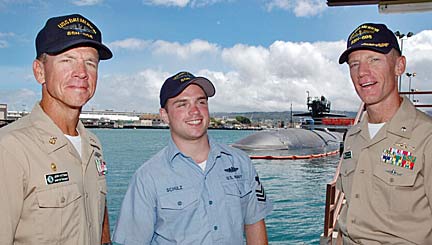
|
Teaching
responsibility
The Navy's PREVENT program aims
to avert drug and alcohol abuse
When Petty Officer Steve Schulz joined the Navy six years ago, he didn't understand why he was required to attend alcohol- and drug-abuse classes designed to help first-term sailors cope with the stresses of daily military life.
Today, Schulz, 23, is an electrician's mate on the nuclear attack submarine USS Bremerton, and is in charge of the ship's drug- and alcohol-prevention program.
He believes the program pointed him in the right direction. "It taught me how to be a responsible sailor," Schulz said.
Malena Brooks, who coordinates Pearl Harbor's alcohol- and drug-prevention program, said it's message is "designed at the first-term sailors, generally between the ages of 18 to 25."
"That's the age when young people take the most risks," said Brooks, who said that some form of a prevention program has been part of the Navy's education system for the past 29 years.
"That's when they have invincibility mind-set. Many of them have just left school and home for the first time. ... Many of them haven't had to face situations with negative consequences, things that have taught them to behave differently and responsibly.
"For many, the first time may be the most devastating. This program is geared to have them thinking about their behavior."
For the past 10 years, it has been called PREVENT, administered by the Pacific Institute for Research and Evaluation. Recently, the Navy renewed its contract to continue PREVENT for the next five years under a $20 million grant.
Brooks said her company has held training classes at 16 sites serving 47 Navy bases from Japan and Italy to Florida and Pearl Harbor. Last year, more than 30,000 sailors graduated from the three-day session.
At Pearl Harbor, these classes, which last for eight hours, are required only by the Pacific Fleet's Submarine Command. However, if other Navy commands in the Pacific request the training, Brooks said her staff will fulfill the need.
In 2003, before the aircraft carrier USS Constellation was decommissioned, Brooks went onboard as a facilitator, giving training not only in alcohol and drug prevention, but areas such as personal finance management, interpersonal responsibility and health issues.
"We take classes where the sailors are," Brooks said.
She noted such training becomes even more imperative now with so many sailors returning home from long deployments at sea, participating in the war on terrorism and possibly struggling to find a way to return to normalcy.
Each year, 750 to 1,000 Pearl Harbor and other Hawaii sailors finish the program. Brooks said it costs about $100 to educate one sailor.
Brooks said her staff acts as "facilitators," not instructors, and the intent of the program is to place sailors in a group of no more than 25 "where they can discuss, evaluate and consider ways to change when they place themselves at risk."
But PREVENT is only one of several Navy programs designed to deglamorize alcohol among sailors. This is especially needed when a vessel like the Bremerton goes into Pearl Harbor for major work for more than a year and its 175 sailors must cope with shore duty.
Cmdr. Jerry Logan, commander of the Bremerton, said that besides attending PREVENT's mandatory classes, each new sailor also is counseled first by Master Chief Jerry Pittman, who is head enlisted sailor on the Bremerton, and then by himself.
Under the Navy's "zero tolerance" policy, all new sailors are screened with urinalysis, first taken when the sailor reports in and with unannounced tests throughout the year. Each new sailor also is given a business card with the phone numbers of the key leaders on the Bremerton as well as local cab companies.
"This they can use to get a free cab ride home," Pittman said. "The command will pay for it and if he uses it, there are no reprisals."
Supervisors on the Bremerton also must attend a one-day seminar designed to help them counsel those who work under them. Pittman said sailors who may be of "high risk" like those about to turn 21 or "may be drinking a lot" are asked to attend meetings to discuss their behavior.
Since the Bremerton is in drydock, Logan, an Iron Man triathlon participant, leads his sailors twice a week as they run in formation. "It's a way for each guy to recognize that he's part of a team -- a very important part."
Pittman said that since 68 percent of the Bremerton's crew is single, he has tried to involve them in community service activities, such as participating in Special Olympics or building homes for the less privileged.
"We're trying to find alternatives to going to bars, things to do besides finding themselves at the bar drinking," Pittman said. "The message is that you can have a good time without alcohol. We don't tell them don't drink alcohol, but to act responsibly."
E-mail to City Desk
[News] [Business] [Features] [Sports] [Editorial] [Do It Electric!]
[Classified Ads] [Search] [Subscribe] [Info] [Letter to Editor]
[Feedback]
